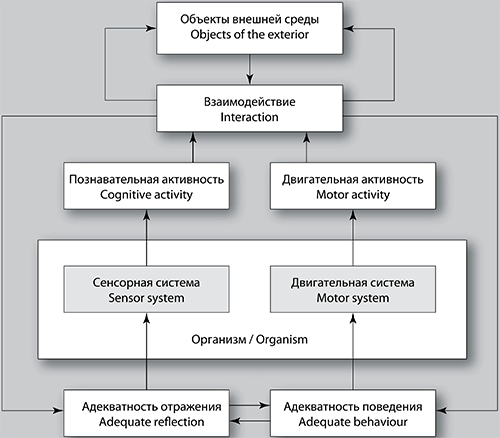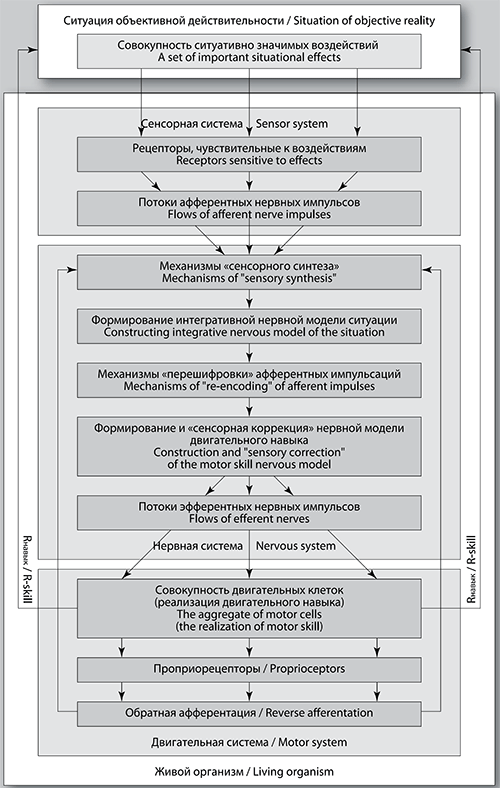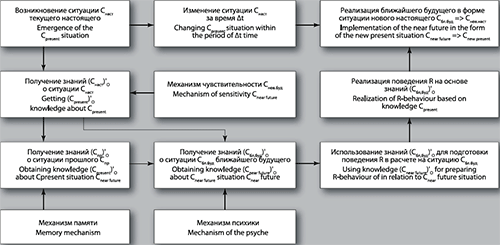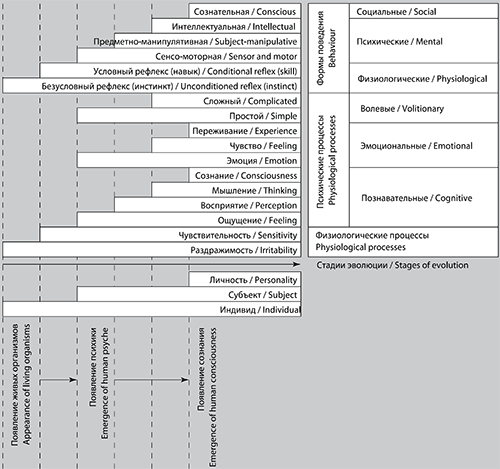Article
Kornienko A.F. (2018) The nature of psyche and mental form of reflection. National Psychological Journal. 3, 104-116.
Abstract
Background. The question about nature and essence of psyche and psychical form of reflection till now is opened in spite of effort of many scientists. As a result the problem of scientific definition of psyche and its nature is being one of the most fundamental problems in psychology.
The Objective of the research is to show: a) where the complexity of solving the problem of psyche lies; b) what logic options of solving this problem that are offered in national psychology, particularly in the works of А.N. Leontev and N.I. Chuprikova, can be adduced and why they are insolvent; c) how it is possible to solve the problem of psyche and mental form of reflection using the major concepts of the reflection theory and adequacy concept of behaviour in constantly changing conditions of reality.
Design. The term “psyche” as a theoretical concept is introduced to explain the ability of living organism (opposed to lifeless) to react to external impact by various activity. Critical analysis of natural-scientific definitions of psyche in the works of А. N. Leontiev and N.I. Chuprikova is presented.
Their discrepancy and insufficient scientific background are shown. Main assumptions of the reflection theory are coined, and further definitions of non-mental forms of reflection (e.g. biochemical, physiological, neurophysiological) and also essence of psyche and specific features of psychical forms of reflection are shown. The paper presents a model that reverberates the author’s idea about the dynamics of the evolving psyche and mental processes (e.g. cognitive, emotional, volitionary) due to which mental forms of reflection and of behaviour regulation are fulfilled.
Results. The analysis of natural-scientific definitions of psyche and mental form of reflection that the national psychology dwells upon show their inconsistency and scientific insolvency. The author's version of solving the problem of psyche and determining specific features of mental form of reflection are given an account based on the major concepts of the reflection theory and the need for behaviour adequacy.
Conclusions. In order to shape the essence of psyche, specific features of mental form of reflection and features of mental processes it is necessary to distinguish forms of reflection, allocation of their functions and constraints. Reflection which can be attributed to non-mental (e.g. biochemical, physiological, neurophysiological) form, does not allow to provide behaviour adequacy in a rapidly changing conditions of reality. Based on reflection, behavior always occurs with certain delay in time. If eliminated, this drawback is provided by occurrence of a brain and a property named “psyche”, which provides mental form of reflection as reflection of the near future of objective reality.
Accepted: 03/18/2018
Pages: 104-116
DOI: 10.11621/npj.2018.0310
PDF: Download
Keywords: psyche; nature of psyche; reflection theory; non-mental forms of reflection; mental form of reflection; mental processes;
Available Online 30.09.2018

Fig. 1. Mechanism of organism interaction with objects of the exterior through the motor and cognitive activity

Fig. 2. Neurophysiological mechanisms of motor skills based on «sensory synthesis» and «sensory correction» (Kornienko, 2010, 48)

Fig. 3. Mechanism of realization of the mental form of reflection of the features of the situation of the current present and the regulation of behavior adequate to the peculiarities of the situation of the new present in which the organism is at the time of the conduct.

Fig. 4. Ratio of mental processes and behaviour of the subject in dynamics of the evolving psyche
References:
Anokhin P.K. (1970). Theory of a functional system. [Uspekhi fiziologicheskikh nauk]. 1(1), 19–54.
Bernshtein N.A. (1947). On shaping movements. Moscow, Medgiz.
Bekhterev V.М. (1991). Objective psychology. Moscow, Nauka.
Chuprikova N.I. (2004). Psyche and the subject of psychology in the light of the achievements of modern neuroscience. [Voprosy psikhologii], 2, 104–118.
Chuprikova N.I. (2015). Psychic and mental processes (the system of general psychology concepts). Moscow, Yazyki slavyanskoy kul’tury, Znak.
Chuprikova N.I. (1985). Psyche and consciousness as brain functions. Moscow, Nauka.
Degtyarev V.P. (1997). Principles of organization of control functions. [Fiziologiya cheloveka]. Vol. 1, Moscow, Meditsina, 98–105.
Dubrovsky D.I. (1990). Psychic and Brain: Results and Prospects for Research. [Psikhologicheskiy zhurnal], 11(6), 3–15.
Dubrovsky, D.I. (1971). Psychic phenomena and the brain: a philosophical analysis of the problem in connection with certain topical problems of neurophysiology, psychology and cybernetics. Moscow, Nauka.
Ginetsinsky V.I. (1997) Propaedeutic course of general psychology: a textbook. St. Petersburg. Izdatel’stvo S.-Petersburgskogo Universiteta.
Ivanitsky A.M. (1996). Brain base of subjective experiences: the hypothesis of information synthesis. [Zhurnal vysshey nervnoy deyatel’nosti im. I.P. Pavlova], 46(2), 241–252.
Ivannikov V.A. (2015). On the nature and origin of the psyche. National Psychological Journal, 3, 15–23. doi: 10.11621/npj.2015.0302
Kornienko A.F. (2010). The emergence and development of pre-mental, mental and social forms of behaviour regulation of the organism, subject, personality. Kazan, Pechat’-Servise-21 vek.
Kornienko A.F. (2003). Methodology and methods of psychological research: a textbook. Kazan.
Kornienko A.F. (2005). General theory of emotional mental processes. Kazan, Izdatel’stvo TGGPU.
Kornienko A.F. (2009). Psychic and mental processes: a unified system of psychological concepts of general psychology. [Russian scientific journal], 4 (11), 77–89.
Kornienko A.F. (2016). Tier-based system classification of mental processes. [Gumanitarnye osnovaniya sotsial’nogo progressa: Rossiya i sovremennost’ : sbornik statey Mezhdunarodnoy nauchno-prakticheskoy konferentsii]. In 8 parts. Part 1. Eds. V.S. Belgorodsky, O.V. Kashcheeva, V.V. Zotova, & I.V. Antonenko. Moscow: FGBOU VO “MGUDT”, 133–141.
Kornienko A.F. (2008). Conscious and unconscious mental states. [Psikhologiya psikhicheskikh sostoyaniy: teoriya i praktika : materialy Pervoy vserossiyskoj nauchno-prakticheskoy konferentsii. Kazanskiy gosudarstvennyy universitet, 13-15 noyabrya 2008 g]. Part I. Kazan, Novoe Znanie, 474–478.
Kornienko A.F. (2013). Correlation of the concepts «subject», «subjectivity», «subjectivity». [Chelovek, sub»ekt, lichnost’ v sovremennoy psikhologii: materialy Mezhdunarodnoy konferentsii, posvyashchennoy 80-letiyu A.V. Brushlinskogo]. Vol. 1 Ed. A.L. Zhuravlev, & E.A. Sergienko. Moscow, Institut Psikhologii, RAN, 208–210.
Kornienko A.F. (2008) Specific features of mental forms of reflecting reality. [Vestnik LGU im. A.S. Pushkina], 2, 5–19.
Kornienko A.F. (2006). The sensitivity of the organism and the «rudimentary form of the psyche». [Vestnik TGGPU], 5, 186–194.
Lebed A.A., & Korovkin S.Y. (2017). The unconscious nature of insight: A dual-task paradigm investigation. Psychology in Russia: State of the Art, 10 (3), 107–119. doi: 10.11621/pir.2017.0307
Lekakh V.A. (2002). The key to understanding physiology: textbook. Moscow, Editorial URSS.
Leontev, A.N. (1994). Psychological Problems of Personality Development in the Preschool Years. Multidisciplinary Newsletter for Activity Theory, 15/16, 24–28.
Leontev, A.N. (1932). The development of voluntary attention in the child. Journal of Genetic Psychology, 2, 52–81.
Leontev, A.N. (1977). The dialectical method in the psychology of memory. Soviet Psychology, 16(1), 53–69. doi: 10.2753/RPO1061-0405160153
Leontev, A.N. (1957). The formation of associative connections: an experimental investigation. Psychology in the Soviet Union. Stanford: Stanford University Press, 164–182.
Leontev, A.N. (1955). The nature and formation of human psychic qualities and processes. Soviet Psychology Bulletin, 11(1), 1–6.
Leontiev A.N. (1983). Emergence and evolution of the psyche. [Izbrannye psihologicheskie proizvedeniya]. In 2 vols. Vol. I. Moscow, Pedagogika, 143–279.
Lomov B.F. (1984). Methodological and theoretical issues of psychology. Moscow: Nauka.
Mazilov V.A., & Kostrigin A.A. (2017). The work of V.A. Snegirev: An historical and psychological study. Psychology in Russia: State of the Art, 10(1), 198–210. doi: 10.11621/pir.2017.0114
Mirakyan A.I. (2004). Contours of transcendental psychology. Moscow, Institut Psikhologii RAN.
Nagdyan R.M. (2017). Mystery of the psyche: transcendental psychology and metaphysics. Yerevan, Lusabats.
Pimenov V.V. (2005). NON-substantial approach to determining the physical essence of the «time» concept. A new look at the old equations. [Institut issledovanij prirody vremeni]. Retrieved from: http://www.chronos.msu.ru/RREPORTS/pimenov_ne.htm – (accessed 02/02/2018).
Severtsev A.N. (1939). Morphological patterns of evolution. Moscow, Leningrad, Izdatel’stvo AN SSSR.
Severtsev A.S. (1990). The direction of evolution. Moscow, Izdatel’stvo MGU.
Sechenov I.M. (1942). Reflexes of the brain. - Moscow, Leningrad, Izdatel’stvo AN SSSR.
Sokolov E.N. (1986) Nervous model of the stimulus. [Voprosy psikhologii], 4, 128–136.
Velichkovsky B. M., Krotkova O. A., Sharaev M. G., & Ushakov V. L. (2017). In search of the “I”: Neuropsychology of lateralized thinking meets Dynamic Causal Modeling. Psychology in Russia: State of the Art, 10 (3), 7–27. doi: 10.11621/pir.2017.0301
Voronin A. N., & Kochkina O. M. (2017). Discourse abilities in the structure of intelligence. Psychology in Russia: State of the Art, 10 (3), 93–106. doi: 10.11621/pir.2017.0306For citing this article:
Kornienko A.F. (2018) The nature of psyche and mental form of reflection. National Psychological Journal. 3, 104-116.


